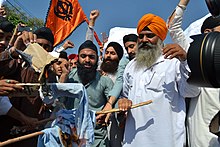Islam and Sikhism
[9] Kirat Karna (doing an honest livelihood — earning honestly without any sort of corruption); Naam Japna (to chant and meditate on Naam, read and follow "The One"); and Vand Chhako (selfless service [sewa] and sharing with others) are fundamental to Sikhism given by[tone] Guru Nanak Dev Ji.The first major interaction between the two religions happened when Guru Nanak spent two years in Mecca and the Middle East.[7][26][page needed] Islam considers itself to be a perfect and final religion,[26] and warns against innovation (bid‘ah) to what is revealed in the Quran and the Hadiths.[28] It teaches that many religious traditions are valid, leading to the same Waheguru, and it rejects that any particular religion has a monopoly regarding absolute truth for all of humanity.[32] However, adds Esposito (2003), modern thinkers have argued against execution as penalty for apostasy from Islam by invoking Quranic verse 2:256.Thus, it does not find merit in fasting, which is banned as an austerity, as a ritual, or as a mortification of the body by means of wilful hunger.[64] Halal meat is required in Islam, prepared by ritual slaughter that involves cutting the jugular veins of the animal with a sharp knife.[67][68] The Golden Temple (Harmandir Sahib) in Amritsar, India is not only a central religious place of the Sikhs, but also a symbol of human brotherhood and equality.The four entrances of the holy shrine from all four directions, signify that people belonging to every walk of life are equally welcome.The main three principles taught by the Guru were, Naam Japna (to remember the one God), Kirat Karni (to live an honourable life), Vand Chakna (to share with others).The Emperor established an Ibadat Khana, which served as a platform for religious debates and dialogues among different communities, including Sikhs.[82] He wore two swords of Miri and Piri and built the Akal Takhat, the Throne of the Immortal, which is the highest political institution of the Sikhs.[87] The Nawab of Malerkotla, Sher Mohammad Khan, protested against the execution of the Sahibzaade, after which Guru Gobind Singh blessed the state.Many historians consider this as a reason why Malerkotla was the only city not harmed by Banda Singh Bahadur during his military campaign.[88][89] While there is no consensus on the issue of Guru Nanak’s faith prior to the advent of Sikhism, one largely overlooked theory proposed by Dominique Sila-Khan in her works, Crossing the Threshold: Understanding Religious Identities in South Asia (2004) and Conversions and Shifting Identities (1997), argues that Guru Nanak was neither Hindu nor Sufi Muslim in the ‘mainstream’ sense, but rather, a Nizari Ismaili Muslim prior to Sikhism’s creation.[95] The region had passed from the control of the Durrani Empire of Afghanistan, and four centuries of Muslim rule under the Mughals and the Afghans, to the Sikhs under Ranjit Singh in 1819.[94] The Sikh rulers of Kashmir enacted several anti-Muslim laws,[95] which included handing out death sentences for cow slaughter,[97] closing down the Jamia Masjid in Srinagar, and banning the azaan, the public Muslim call to prayer.[12] In December 1588, a Sufi saint of Lahore, Mian Mir, visited Guru Arjan Dev at the initiation ceremony before the construction of the Harmandir Sahib (Golden Temple).He wrote a laudatory letter to Shaikh Farid Bukhari (Murtza Khan) with an excerpt quoted [sic] as follows:[102][103][104] "The execution of the accused Kafir of Goindwal at this time is a very good achievement indeed and has become the cause of a great defeat of hateful Hindus.The object of levying Jazia on them is to humiliate and insult the Kafirs and Jehad against them and hostility towards them are the necessities of the Muhammedan faith.[105] As people from both sides left their homes and belongings to travel across the new border of India and Pakistan, many were killed on trains and land in what is thought to be acts of revenge.After the former colonial kingdoms and Princely states were being divided along language differences, Punjab and Sikhs were not given any special status in the Constitution Act of India.[106][107] In 2009, the Taliban in Pakistan demanded that Sikhs in the region pay them the jizya (poll tax levied by Muslims on non-Muslim minorities).[109] In April 2016, two 16-year-old Muslims bombed a gurudwara in the German city of Essen using fire extinguishers that were converted into an explosive device.The two denied that it was religiously motivated, saying it was “just for the kick of building fireworks!” However, before setting off the blast, the two tried to break into another gurudwara in North Rhine Westphalia.







Islamand other religionsAbrahamic religionsChristianityCatholicismProtestantismMormonismJudaismHinduismJainismPagan SabianismPre-Islamic Arabian religionAntisemitismApostasyBlasphemyDemocracyLGBTQ peopleModernityPoliticsShia–SunniReligious conversionSecularismViolenceSikhismPeopleOutlineHistoryGlossarySikh gurusGuru NanakGuru AngadGuru Amar DasGuru Ram DasGuru ArjanGuru HargobindGuru Har RaiGuru Har KrishanGuru Tegh BahadurGuru Gobind SinghGuru Granth Sahib Selected revered saintsBhagat KabirBhagat RavidasBhagat FaridBhagat RamanandBhagat BeniBhagat NamdevBhagat SadhanaBhagat BhikhanBhagat ParmanandBhagat SainBhagat DhannaBhagat PipaBhagat SurdasBhagat JaidevBhagat TrilochanBhatt KalsharBhatt BalhBhatt BhalhBhatt BhikaBhatt GayandBhatt HarbansBhatt JalapBhatt KiratBhatt MathuraBhatt NalhBhatt SalhBaba SundarSatta DoomBalvand RaiPhilosophyNaam JapoKirat KarōVand ChakkōCharhdi KalāGuru Maneyo GranthFive ThievesFive VirtuesSikh Rehat MaryadaProhibitionsArdāsKirtanAmrit VelāDasvandThe Five KsLangarSimranNitnemDastarNaam KaranAmrit SanskarAnand KarajAntam SanskarDasam GranthSarbloh GranthFive BanisTakhtsGurdwaraHarmandir SahibAkal TakhtKeshgarh SahibDamdama SahibPatna SahibHazur SahibIk OnkarKhalsaWaheguruPanj PyareNirgun and SargunKhandaNanakshahi calendarCriticismJathedar of Akal TakhtSikhism and HinduismSikhism and JainismAbrahamic religionArabian PeninsulaIndian religionPunjab regionIndian subcontinentMuhammadprophetShariaDaily prayerspillars of IslamKirat KarnaNaam Japna
